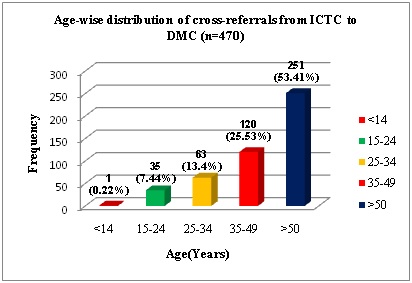Study of cross-referrals between integrated counselling & testing centre and RNTCP-Designated Microscopy Centre at a tertiary care hospital in Bengaluru, Karnataka
Abstract
Introduction: HIV and TB infections continue to fuel and amplify each other. The present study was designed to assess the socio-demographic profile of the clients visiting ICTC and to assess the pattern of cross referrals between ICTC and RNTCPDesignated Microscopy Centre at a private medical college in Bengaluru, Karnataka.
Materials & Methods: This was a descriptive study comprising of all the clients visiting ICTC and TB Suspects visiting RNTCP DMC during the study period from April to December 2018. Data entry was done in MS excel and analyzed in SPSS software.
Results: A total of 9405 clients visited ICTC during the study period, 68 (0.73%) of them were diagnosed to be HIV positive. HIV Seropositivity was found to be higher among 35-49 yrs age group 28 (41.17%), male clients 37(54.41%) and among semiskilled workers 19(27.94%) followed by housewives 18 (26.50%). There were 9 HIV concordant couples. 252(19.06%) of the TB suspects visiting the DMC were TB positive. 8(3.17%) clients had HIV-TB Co-infection. Statistically significant association was observed between HIV status and TB status of the study subjects (p <0.05).
Conclusion: ICTC is an excellent site for both HIV testing and screening for TB. Similarly, RNTCP DMC is instrumental in TB case finding and also for detecting individuals at high risk for HIV seropositivity. Appropriate cross referral between these two centres plays a pivotal role in reducing the burden of both infections.
Downloads
References
2. Sharma SK, Mohan A, Chauhan LS, et al. Contribution of medical colleges to tuberculosis control in India under the Revised National Tuberculosis Control Programme (RNTCP): lessons learnt & challenges ahead. Indian J Med Res. 2013 Feb;137(2):283-94.[pubmed]
3. Mehra B, Matlani M, Rawat D, Gautam H, Bhalla P. HIV-TB Cross-referral and Collaborative Strategy: 8 Years of Our Experience from An Urban Health Centre in North India. The Indian Journal of Chest Diseases & Allied Sciences [Internet]. 2015 [cited 28 January 2019]; 58(1):6-11.
4. Mathur A, Sharma B, Bithu R, Mittal P. Socio-demographic Characteristics of Clients Visiting Integrated Counseling and Testing Centre (ICTC) at SMS Medical College, Jaipur (Rajasthan) India. International Multispecialty Journal of Health [Internet]. 2015[Cited 27 January 2019];1(2):27-31.
5. Chauhan N, Sharma A. A study on socio-demographic characteristics among HIV/AIDS patients attending integrated counseling and testing centre in Udaipur, Rajasthan. Indian Journal of Applied Research [Internet].2018 [Cited 27 January];8(6):38-40.
6. Haider S, Tudu L, Kashyap V. Sociodemographic profile of people attending integrated counselling and testing centre of tertiary care hospital of Jharkhand. Int J Community Med Public Health. 2016 Jan;3(1):319-322. DOI: http://dx.doi.org/10.18203/2394-6040.ijcmph20151584.
7. Mishra S, Mishra A. Socio-Demographic Profile of an Integrated Counseling and Testing Centre Attendees: A Cross Sectional Study at a Tertiary Care Hospital in Gwalior, India. Natl J Community Med 2013; 4(3):493-497.
8. Roma C, Pramod S. Profile of HIV seropositive attendees of integrated counseling and testing center of a tertiary care teaching hospital in Kolhapur, India. International Journal of Contemporary Medical Research [Internet] 2017;4(6):1330-1336.
9. National AIDS Control Organization & ICMR-National Institute of Medical Statistics (2018). HIV Estimations 2017: Technical Report [Internet]. Naco.gov.in. 2017 [cited 30 January 2019].
10. Kumari R, Kumar M, Gulati AK, Sundar S, Mohapatra SC. A Study on the Socio demographic Profile of the Attendees at the ICTC of Institute of Medical Sciences, BHU, Varanasi, Uttar Pradesh. Indian J Comm Health 2016; 28, 1: 42 - 47.
11. Ramachandran R, Chandrasekaran V, Muniyandi M, Jaggarajamma K, Bagchi A, Sahu S. Cross-referral between HIV counselling and testing centres and smear microscopy centres in Tamil Nadu. Int J Tuberc Lung Dis 2009; 13(2):221–5.[pubmed]
12. Shrivastava S, Shrivastava P. HIV-tuberculosis interface: a comparison of collateral prevalence of HIV and tuberculosis in an urban health centre. Annals of Tropical Medicine and Public Health 2013; 6(3):290.
13. Gupta AK, Singh G, Goel S, Kaushik P, Joshi B, Chakraborty S. Efficacy of a new model for delivering integrated TB and HIV services for people living with HIV/AIDS in Delhi – case for a paradigm shift in national HIV/TB cross-referral strategy. AIDS Care 2013;26(2):137-141.[pubmed]
14. Giri PA, Deshpande JD, Phalke DB. Prevalence of Pulmonary Tuberculosis Among HIV Positive Patients Attending Antiretroviral Therapy Clinic. N Am J Med Sci. 2013 Jun;5(6):367-70. doi: 10.4103/1947-2714.114169.[pubmed]
15. Dahiya N, Bachani D, Das R, Rasania S. Socio-demographic and clinical profile of HIV positive patients attending integrated counseling & testing centre of a primary health centre in Delhi. SAARC Journal of Tuberculosis, Lung Diseases and HIV/ 2017;14(1):22-26.

Copyright (c) 2019 Author (s). Published by Siddharth Health Research and Social Welfare Society

This work is licensed under a Creative Commons Attribution 4.0 International License.


 OAI - Open Archives Initiative
OAI - Open Archives Initiative


